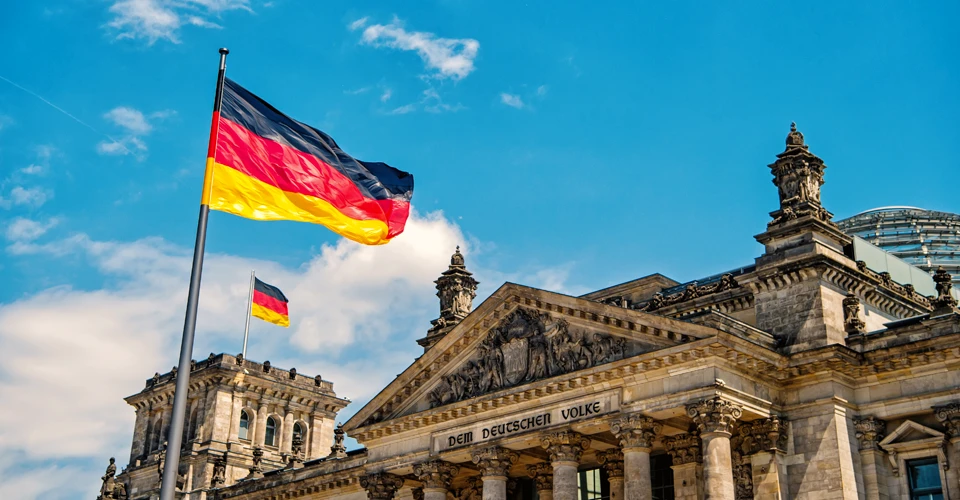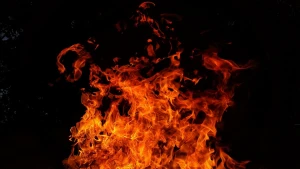
Documents reveal Kremlin's attempts to form antiwar coalition in Germany
According to a vast collection of Russian papers analyzed by The Washington Post, the Kremlin wants to unite the far-right and far-left political forces in Germany
Sahra Wagenknecht, a parliamentarian for the far-left Die Linke party in Germany, organized the rally that drew 13,000 people to the Brandenburg Gate on February 25 to demand an end to the supply of arms to Ukraine.
Wagenknecht lamented the idea that soon-to-arrive German tanks in Ukraine might once more be used to fire at "Russian women and men."
She urged the formation of a new peace movement and criticized the killing in Ukraine, but she failed to mention Russia's invasion. "We don't want Germany to be drawn deeper into this war," she added.
Numerous supporters of the far-right Alternative für Deutschland (AfD) party and editor of a right-wing magazine, Jürgen Elässer, were present in Berlin and applauded Wagenknecht's efforts to cut off Ukraine.
Though the union is still ad hoc and unofficial, political opponents in Berlin have been joining together under the banners of ‘peace’ for months.
However, according to a trove of private Russian documents largely dating from July to November that were obtained by a European intelligence service and examined by The Washington Post, marrying Germany's extremes is an explicit Kremlin goal and was initially suggested by senior officials in Moscow in early September.
The records detail discussions between Russian political strategists and Kremlin officials, as well as the Kremlin's instructions to the strategists to concentrate on Germany in order to strengthen antiwar sentiment in Europe and reduce support for Ukraine.
There is no information in the archives that reveals communications between Russian strategists and any German allies. Interviews, however, reveal that numerous AfD members and at least one person close to Wagenknecht spoke with Russian officials as the preparations were being developed.
The documents reveal, for the first time, the Kremlin's direct attempts to meddle in German politics by attempting to form a new coalition between Wagenknecht, the extreme left, and the AfD as well as by supporting protests by far right- and left-wing groups against the German government.
The Kremlin is trying to weaken Western unity and stop the war on its terms, which is why it is working to incite antiwar feeling in Germany as part of a covert front in Russia's conflict with Ukraine.
Exploiting peace protests to create division in the West is a method that was developed in the Soviet era and has reemerged in light of Russia's invasion of Ukraine.
The Kremlin's suggested plan would unite two German factions that have long had pro-Russian views. The 53-year-old former Communist Wagenknecht was raised in East Germany and has had numerous run-ins with Die Linke's more conventional leadership. According to public opinion surveys, she is becoming more popular across the country and is openly considering starting a new party.
The AfD has mirrored the Kremlin's position that the war in Ukraine was started by the United States and that Russia was merely defending itself from NATO encirclement while protecting Russian speakers in eastern Ukraine. The AfD is sometimes referred to as the party of "Putin understanders" in Germany. Documents and interviews reveal that Moscow has long fostered dozens of AfD members, particularly through expensive, all-expenses-paid visits to Russia.
Dmitry Peskov, a spokesman for the Kremlin, refuted any claims that it was attempting to meddle in German affairs. Peskov informed The Post that "this is completely fake." "We never interfered before, and now we really don't have time for this."
At least two influential individuals, one in the AfD and the other close to Wagenknecht, claimed to have spoken with Kremlin representatives or friends at the time Moscow's coalition plans were being developed.
Ralph Niemeyer, Wagenknecht's ex-husband, was one of those in touch with Russian officials. He disclosed to The Post that he was still in almost daily contact with Wagenknecht and that he had recently had meetings in Moscow with senior Kremlin figures during which he had learned that "there are certain people in Russia who have [an] interest" in seeing Wagenknecht and the far right come together.
The party's alignment with Russia over the war in Ukraine, as well as with the Kremlin's anti-LGBTQ and anti-globalist agenda, is seen by many AfD members of parliament as natural — and, they stress, not dictated by Moscow. The party was established in 2013 to oppose how the German government handled the euro-zone crisis, but it quickly adopted increasingly right-wing positions, including being anti-immigrant and raging against what party members perceived as Germany's Atlanticist and liberal ruling elites.
"Normally, our interests in the concept of national sovereignty would coincide with defending Ukraine. We believe in a Europe of fatherlands”, said Andreas Kalbitz, a former Brandenburg AfD chairman and current executive board member of the party till 2020.
“But this is a proxy war. And for many conservatives, Putin is the only significant figure actively opposing the notion of Western liberalism as a whole. In times of conflict, especially, you must pick a side. However, you cannot claim that AfD is some sort of fifth column,” he added.
Niemeyer and other AfD members have visited Russia ever since the war started. When Niemeyer visited Vladivostok, a Russian city in the Far East, in September, he shared pictures on social media of his meetings there with Peskov, Foreign Minister Sergei Lavrov, and Gazprom CEO Alexei Miller at an industrial summit.
At the time, Niemeyer said he was in Russia to discuss a new gas supply agreement through Nord Stream 2 on behalf of what he named "a German government in exile."
The exercise's purpose was quite clear: it was meant to exert public pressure on Chancellor Olaf Scholz's administration to seek a new understanding with Moscow.
Some AfD members are hesitant to work with Wagenknecht out of concern that she may end up reducing the party's potential as a national force.
But Petr Bystron, the AfD's foreign policy spokesman, finds a partnership with Wagenknecht appealing. "It is visible that on one side there is the globalist coalition and on the other side the populists, in the positive sense of the word."
Bystron claimed that any such union was occurring naturally and was unrelated to any plans the Kremlin may have had. According to him, AfD supporters originally banded together with the farleft to fight limitations during the pandemic. "This coalition is already [here],” he said. “The people are on the streets. They are already there. They are standing side by side".
- News














































